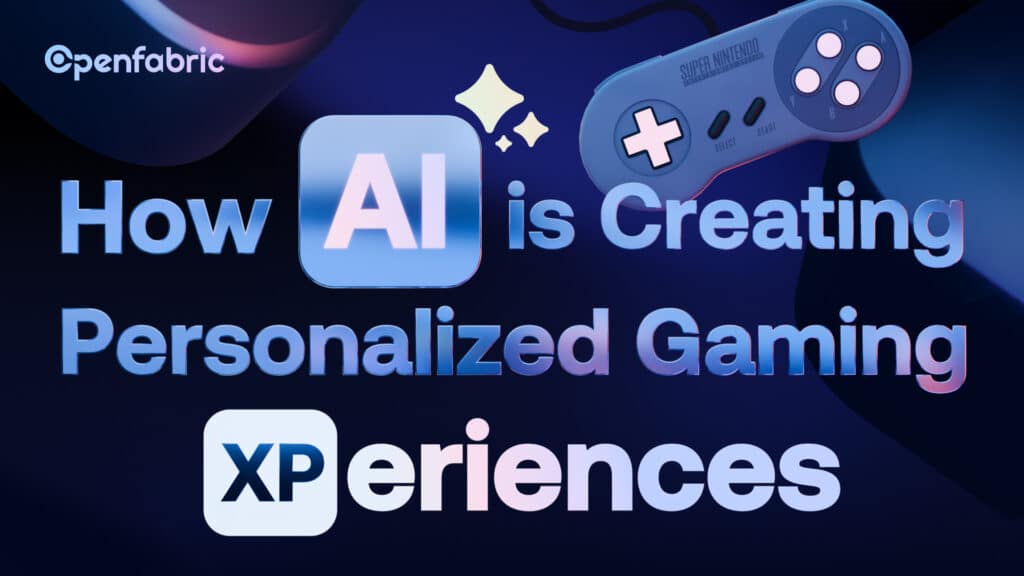
July 26, 2024 8 minutes read
AI In Gaming: How AI is Creating Personalized Gaming Experiences

The gaming business, however, has been very dynamic since it started. Initially, it was just basic pixelated images, but they have since advanced to generating better experiences. AI in gaming is the main vessel that is in the process of driving the changes in the current industries. AI is now being utilized in video games, marking the beginning of a new era in gaming. One may be wondering how this came to be. The days where game designers can fit one-size-fits-all methods into their game design and methodologies are long gone. Nowadays, players do not find usual quests that are freely chosen to be enough; they want to have the kind of adventures that they like.
Many people consider personalized gaming to revolutionize the gaming industry. More interestingly, due to AI in gaming, the games themselves can have individual stories, challenges, and characters. The implications are more active, happy, and committed gamers.
This has paved the way to the new generation of AI in gaming and personalization. The future looks incredibly promising, with virtually unlimited possibilities for conception and creation.
In this blog post, we aim at discovering how AI in gaming is creating space for individuality and what this could mean for the gaming future.
Buckle up!
What is personalized gaming?
Personalized in gaming are the attributes or design made in the game to meet or suit the player. It is all about designing a responsive and adaptive game or a gaming environment to the playing ability and style of a player. These can be preferences concerning the avatars and the NPCs, as well as the general game environment.
There are several forms of personalization in the context of gaming. They include:
- Adjustable difficulty levels
This ensures that players are equally challenged depending on the skills they demonstrate. Players also become frustrated, especially when a particular game’s levels are too difficult. This denies any game the fun and relaxation in it.
Thus, despite adapting to the particular performance levels, the game stays interesting and appealing. - Customized characters
The concept of developing characters that change and grow with respect to users’ decisions enables the creation of incredible and customized game environments. It is somewhat like a home away from home.
This means that you can design your characters in terms of looks, their social relations and indeed in terms of their skills in a manner that you find most entertaining. - Unique storylines
A conventional game typically has a planned course and a clear path in the game. Through personalisation, on the other hand, the individual characters allow the game’s storyline to progress according to actions taken by the gamers. Thus, the gaming experience is even more distinctive.
Before the emergence of AI, all these may have seemed like a dream. On a general note, AI in gaming makes personalized gaming possible by analyzing player behavior, preferences, and patterns. It’s a powerful tool that enables games to become more engaging, and fun.
Innovations Driven by AI in Gaming
The application of AI in gaming is transforming the gaming industry radically. It gives developers new possibilities to create truly engaging experiences that were previously unattainable. AI-driven innovations are the turning point in game development. Thus, developers can create more imaginative and engaging games using this method.
Some examples of AI-driven innovations in gaming include:
Procedural Content Generation (PCG)
PCG enables the creation of vast, diverse game worlds, saving developers time and resources. AI can generate content such as levels, terrain, and even entire games with this technology.
We can see this being applied in games like “No Man’s Sky” which uses PCG to create an entire universe with 18 quintillion planets. The most interesting part is that each has its own ecosystems and landscapes. Another use case is seen in Minecraft.
Predictive analytics and adjustments
Using AI in gaming helps to predict player behavior, enabling games to adapt and respond accordingly. AI creates a predictive analysis to make more challenging and engaging games. Simultaneously, it also adjusts the difficulty levels accordingly based on the player’s performance.
Emotional Intelligence (EI)
AI is capable of recognizing a player’s emotions and responding accordingly. By doing so, it creates a more empathetic and engaging experience. This enables games to adapt to player emotions, which provides a more personalized and immersive experience.
Games like “Hellblade: Senua’s Sacrifice” uses AI in gaming to analyze the player’s emotions and stress levels. Therefore, creating a more emotional and engaging gaming experience.
Natural Language Processing (NLP)
AI enables players to interact with games using simple voice commands or text input. NLP creates a more intuitive gameplay. It allows players to communicate with games more naturally. With NLP, games are able to respond to and understand human language which enhances communication with the players. You can widely see this in games that include a chatbot feature.
Games like Destiny 2 and Overwatch have integrated NLP, enabling players to communicate with teammates more effectively. In addition to this, there is a more natural dialogue between players and NPCs.
Machine Learning (ML)
Machine learning is a feature of AI that is very important in gaming. Applying AI in gaming enables games to learn from player behavior. Therefore, they adapt and improve over time. Integrated with ML, games become more personalized. While ML enables games to become more challenging and engaging, AI learns player tactics and adjusts difficulty levels accordingly. The overall result is a challenging game that will not frustrate the player but will keep them engaged.
These AI-driven innovations enable game developers to create games that are more dynamic, responsive, and engaging. As this technology advances, we are sure to expect even more exciting innovations by AI in the gaming industry.
Impact of AI in Gaming on Player Experience
There is a profound impact of AI in gaming and personalization on player experience. Here are some ways in which the involvement of AI in gaming impact player experience:
- Engaging storytelling
Application of AI in gaming ensures that the games offer narrations that are unique to each person. They do so by integrating with the themes of player choices and actions. Thus, games are capable of creating unique plots tailored to fit the player’s preferences through the utilization of AI technology. - Dynamic gameplay
The Incorporation of AI in gaming enables games to shift their play pattern and in the process, vary in difficulty, and distribution of resources based on the player abilities.
Therefore providing players with a dynamic storyline makes the game more interesting because conditions of the game are continually changing. - Personalized challenges and difficulty levels
AI-driven adaptability ensures that the types of tasks and levels of complexity of assignments depend on the preferences and ability of the player
AI identifies the player’s abilities and adjusts the challenges accordingly. Thus, games provide a unique level of difficulty that corresponds with the players’ abilities. - Increased engagement
Personalization helps to increase player engagement and motivation. AI sustains this by delivering a customized content which encourages players to explore new gameplay mechanics and try new strategies. - Enhanced emotional connection
Previously, we looked at how AI in gaming works with the video games’ affective features. As to how exactly it does this is by allowing games to form a closer emotional bond between them and the players. While using AI and EI together, they recognize and respond to player emotions. Thus, games are more empathic and have interesting interactions. - Improved player satisfaction
The general implication of engaging AI in gaming for customization is to enhance client satisfaction.
Involvement of Openfabric AI in Gaming
Openfabric AI has various applications and tools that have vast applications in the gaming industry to create more personalized gaming experiences. These tools are available for developers to use to create games that offer the full benefits of AI in gaming to players.
The Openfabric AI applications and tools used in gaming include:
Openfabric 3D Model Generator V2
One of the most extensively used AI tools in gaming on the Openfabric platform is this tool. Video games are all based on 3D models. However, creating each and every 3D model in a game is time consuming and expensive. This is where the Openfabric 3D Model generator comes in.
This AI tool creates accurate 3D models for use in the game by using text prompts. The generated 3D models can then be transferred to the developer tools for building the game, thanks to their seamless integration and accessibility on modern devices.
The new 3D generator model creates enhanced and flexible results empowering you to deeply explore your creativity.
QRfabric AI App
This AI App is designed to enable developers to create and utilize unique QR codes. These codes are an easy means for users to make payments, access information and get details about events.
It finds its application in games that have in-app purchase features. The QRfabric makes it easier for players to make purchases on the game and from other players.
What makes this tool unique is that the QR codes can be designed with specific logos and customized to suit the user.
Soundfabric AI App
The Soundfabric AI App helps developers and other creatives to transform text prompts into sounds. It uses NLP and machine learning to read and understand the text and produce the corresponding results.
It can be utilized as an AI tool to produce personalized game soundtracks in gaming that resonate with the player
Artfabric AI App
Creating a game interface involves extensive creativity so as to match the players “vibe”. Artfabric AI in gaming enables the developer to create backgrounds, sceneries and even virtual artwork. These help to enhance the player’s experience in the game.
All these tools and AI applications are on the Openfabric AI website to help you unleash your creativity with AI in gaming.
Visit our website to learn more about these tools.
Conclusion
In conclusion, Openfabric AI offers a wide range of powerful tools and applications that are revolutionizing the gaming industry. Our AI tools in gaming are helping game developers create more immersive and engaging experiences for players.
The future of AI in gaming is exciting, and Openfabric AI is at the forefront of this revolution. As AI technology continues to evolve, we can expect even more innovative applications in the gaming industry.

